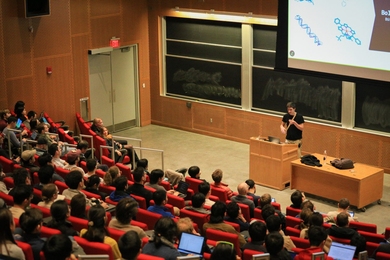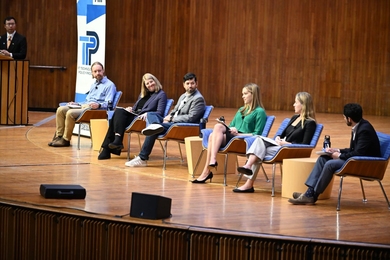Even daily large doses of the high-intensity sweetener aspartame, also known as NutraSweet, had no adverse effect on study subjects' health and well-being, a visiting scientist at MIT reported in the American Journal of Clinical Nutrition last week.
"We conclude that aspartame is safe for the general population," said Paul A. Spiers, visiting scientist in the Clinical Research Center (CRC).
Mood, aggression and selected cognitive functions were tested during a study in which some of the subjects consumed doses of aspartame nearly 20 times the daily amount taken by the vast majority of the general population.
During a four-month period, subjects received either aspartame, sugar or a placebo and underwent physical and psychological testing. Some subjects were given doses of up to 45 milligrams per kilogram of body weight--the equivalent of 17 to 24 12-ounce diet beverages for males and 14 to 19 12-ounce drinks for females. In the general population, most Americans who consume aspartame take in 3 milligrams per kilogram of body weight a day, the equivalent of one or less 12-ounce diet beverage.
Despite the high consumption of aspartame, the 48 normal subjects showed no changes in mood, memory, behavior, electroencephalograms (which record the electrical signals of the brain) or physiology that could be tied to aspartame, Dr. Spiers found. Although some subjects reported headaches, fatigue, nausea and acne, the same number of incidences were reported by subjects taking placebo and sugar as those taking aspartame.
Dr. Spiers noted that these findings corroborate the results of another recent study with preschool and elementary school children that discovered no effect on their moods, activity levels, behavior or thinking after they consumed high doses of aspartame.
He recommended that if a patient reports any adverse effects from a food product, factors such as the patient's overall diet, nutrition and behavior should be carefully tested in a double-blind challenge. "Only in this way can allegations regarding the safety of any food product be properly evaluated before speculation regarding harmful effects begins," wrote Dr. Spiers and co-authors LuAnn Sabounjian of Interneuron Pharmaceuticals of Lexington; Dr. Allison Reiner of Princeton, NJ; Diane K. Myers and Judith Wurtman of the CRC; and Donald L. Schomer in the neurophysiology department at Beth Israel Deaconess Medical Center and Harvard Medical School.
The study was conducted at MIT's CRC. Electro-encephalograms were done at the Beth Israel-Deaconess Medical Center in Boston. This work was supported by a grant from the NutraSweet Co. to the Center for Brain Sciences and Metabolism Charitable Trust.
A version of this article appeared in MIT Tech Talk on September 16, 1998.





